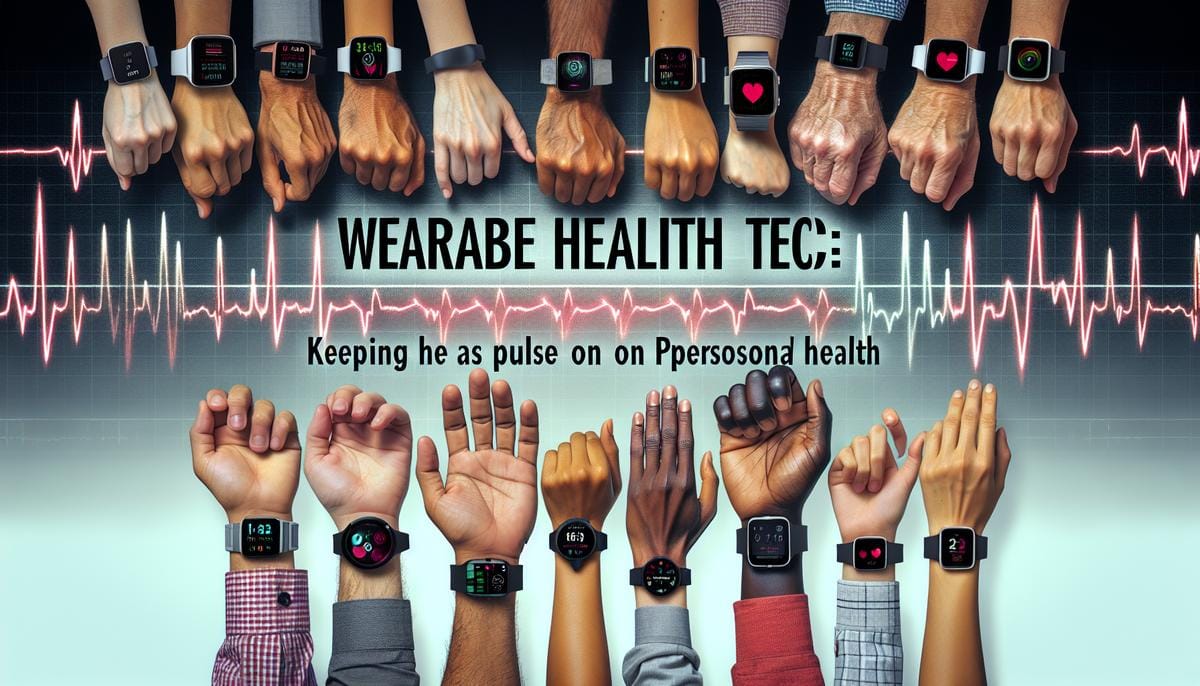Wearable Health Tech: Keeping a Pulse on Personal Health

The Rise of Wearable Health Tech
Health and wellness have become increasingly prevalent in the modern world, with people seeking new ways to monitor and improve their personal health. Wearable health tech has emerged as a popular solution, offering individuals the ability to track vital health metrics right from their wrist. This innovative technology has evolved from basic pedometers to sophisticated devices capable of tracking heart rate, sleep patterns, and more.
Understanding Wearable Health Tech
Wearable health tech encompasses a wide range of devices, including fitness trackers, smartwatches, and specialized medical wearables. These gadgets employ sensors to collect data on various aspects of the wearer's health and activity levels, providing insights that can be used to make informed lifestyle decisions. The integration of mobile apps and cloud-based platforms allows for seamless tracking and analysis of health metrics, making wearable tech a powerful ally in personal health management.
Benefits of Wearable Health Tech
The allure of wearable health tech lies in its ability to provide real-time feedback on one's health. By continuously monitoring vital signs such as heart rate, blood oxygen levels, and physical activity, individuals can gain a better understanding of their overall well-being.
"Wearable health tech empowers users to take control of their health by providing actionable insights and encouraging proactive health management."
Additionally, these devices often come equipped with features such as reminders to move, breathe, or hydrate, further promoting a healthy lifestyle.
Popular Wearable Health Tech Devices
Some of the most widely adopted wearable health tech devices include the Apple Watch, Fitbit, Garmin fitness trackers, and the Samsung Galaxy Watch. Each device brings its unique set of features and tracking capabilities, with some tailored towards general fitness and others designed for more medical-oriented purposes.
Wearable health tech manufacturers are constantly innovating, adding new sensors and improving algorithms to enhance the accuracy and usefulness of the collected data. As a result, users can expect even more advanced features and functionalities in future iterations of these devices.
The Role of Wearable Health Tech in Preventive Care
Preventive care is a crucial aspect of maintaining good health, and wearable health tech plays a significant role in this domain. By keeping a close eye on their health metrics, individuals can detect potential issues early on, before they develop into more serious conditions. Wearable devices can also serve as a motivational tool, encouraging users to adopt healthier habits, such as regular exercise and balanced nutrition.
Moreover, some wearable health tech devices offer the ability to share data with healthcare professionals, facilitating remote patient monitoring and more personalized care. This collaboration between technology and healthcare providers is reshaping the way we approach preventive care and chronic disease management.
Challenges and Considerations
Despite the numerous benefits of wearable health tech, there are also challenges to consider. Data privacy and security concerns arise as sensitive health information is collected and stored. Users must be diligent in understanding and managing the privacy settings of their devices and the associated apps.
Another consideration is the accuracy of the data collected by wearable health tech. While these devices have come a long way in terms of precision, they are not always on par with medical-grade equipment. Users should approach the data as a helpful guide rather than a definitive diagnosis.
Future of Wearable Health Tech
The future of wearable health tech is bright, with advancements in technology paving the way for even more innovative solutions. The integration of artificial intelligence and machine learning will likely lead to more personalized and predictive health insights. Additionally, the development of new sensors could enable the tracking of a wider range of health metrics, further expanding the utility of wearable health tech.
As the adoption of wearable health tech continues to grow, its impact on personal health and the healthcare industry as a whole will become increasingly evident. With the potential to revolutionize how we approach health and wellness, wearable health tech is a trend worth keeping an eye on.
Conclusion
Wearable health tech is transforming the way individuals monitor and manage their personal health. By providing convenient, real-time access to health metrics, these devices empower users to take a proactive approach to their well-being. As technology continues to evolve, we can expect wearable health tech to become even more integral to our daily lives and healthcare routines. Keeping a pulse on personal health has never been easier, thanks to the advancements in wearable health tech.


